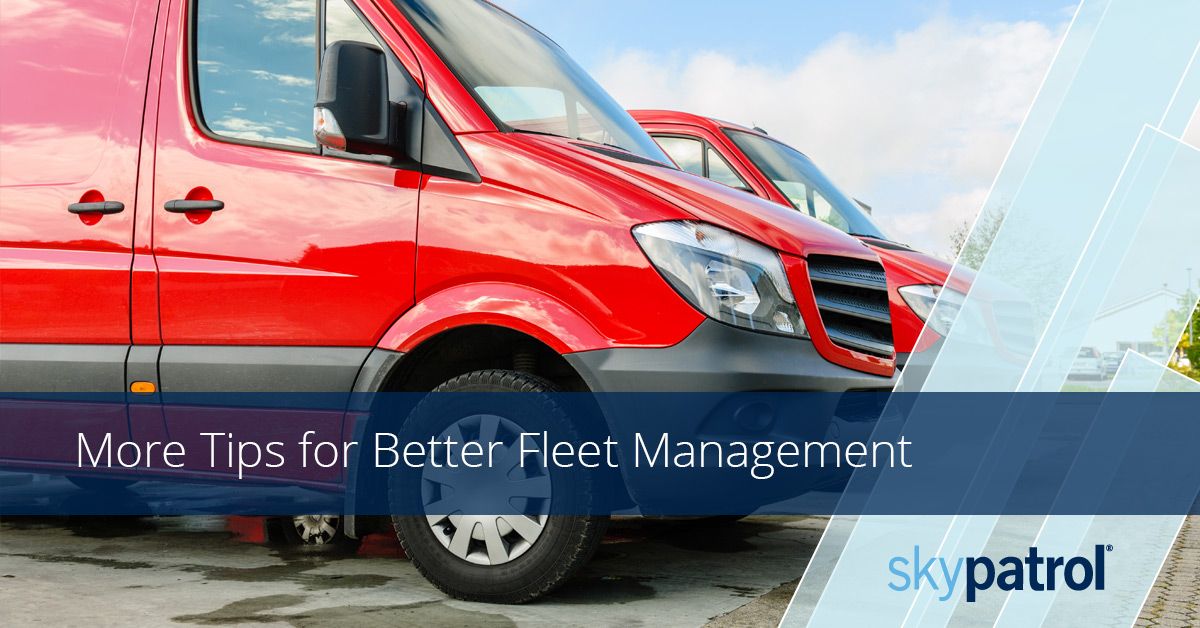In our previous blog, Skypatrol covered how fleet businesses can improve and grow with simple changes to their processes and mindset. We’ll cover the same topic here, giving you even more ways to improve your fleet business.

More Tips for Better Fleet Management
Nip irresponsible driving in the bud.
Fleet drivers are often the most inconsistent and unpredictable part of any fleet business—after all, it’s the most human part of the industry. In order to take on more deliveries and make more money, drivers might resort to reckless driving, speeding, and going on unauthorized roads to get the job done. Conversely, some less motivated drivers will idle their vehicles for long periods of time, take unauthorized joyrides, and take less efficient routes to kill time.
Regardless of the situation, it’s important to nip this behavior in the bud by creating enforceable driving rules and holding drivers accountable for their actions with clearly defined consequences. These rules would ideally be determined on “Day Zero” of your business—but if you’re experiencing erratic driver behavior during the course of business operations, it’s best to sit your entire staff down to stress the seriousness of the new driving rules, and how poor driving can negatively affect the business in general. Irresponsible driving doesn’t just put other people at risk—it costs the business money. This is why irresponsible driving is usually a fireable offense.
Create a consistent customer experience.
Every employee is different—and that means everyone brings a slightly different customer service experience to the table. Unfortunately, employee views of what “good customer service” means can be drastically different, which can lead to a mixed bag of perceptions of your brand. So what does it mean if some people rate your business as 10/10 while others rate it 0/10? Most people researching your business will assume the truth lies somewhere in between—which puts your business at a not-so-solid 5.
To fix this issue, it’s important to establish processes for how employees interact with customers. This doesn’t mean employees need to stick to a script when talking to customers—but it does mean they need to establish some degree friendliness, helpfulness, and transparency. Clear and polite communication is key here—it helps the customer understand how your employee is going to handle business, and it makes the customer feel like they are appreciated by your company. You’d be surprised by effective a friendly, genuine tone and the words “thank you” can be for your employees and your business.
Remember your no. 1 priority as a fleet business.
Commercial fleets of any kind are part of a saturated and competitive industry, which can make fleet owners and managers obsessed with profits, business growth, and brand awareness. But money and growth mean nothing if these managers don’t take care of their employees first. Fleet driver safety is, by far, the most important aspect of running a fleet business—but unfortunately, it can be an afterthought for businesses around the world.
According to a Driver’s Alert study, 333,000 commercial trucks were involved in crashes in 2012 alone, leading to 3,921 deaths (these figures do not include non-truck commercial vehicles). While it’s impossible to completely stop these accidents from happening, a little bit of technology can help improve driver behavior, target big-picture driver problems, and prevent mechanical issues that can cause accidents.
That’s where Skypatrol can help. With cutting-edge GPS technology and innovative fleet management software, fleet companies have more tools than ever before to ensure their employees are productive, efficient, and most of all, safe. Schedule a demo of Skypatrol products today.
